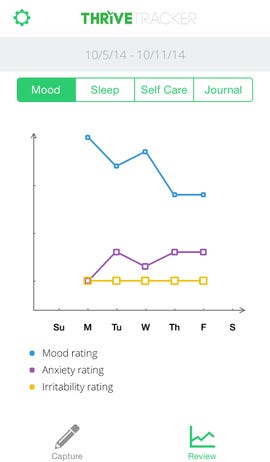
ThriveTracker
Since his diagnosis as bipolar in 2002, computer consultant Adrian Cunanan has worked hard to learn to regulate his mood swings through medication, meditation, exercise and careful sleep monitoring.
“After years of denial, I was able to accept the diagnosis and then persevere through the process of learning to both manage and thrive in life despite the condition,” he reports.
Now, he wants to help others facing mood disorders thrive as well. His Brooklyn-based startup, ThriveStreams, has just released its first product, an app that takes a gamified approach to mood tracking for those with conditions such as depression and bipolar disorder, an illness with alarmingly high suicide rates, according to many statistics.
The free app for iOS, ThriveTracker, collects user data on activities such as meditation, exercise and journaling, as well as therapy attendance and quality and amount of sleep. Users who check in consistently can earn rewards such as product samples, gift cards and MP3 downloads, redeemed through a third-party rewards provider, Kiip. They can even earn rewards for checking in with the app daily.
On the quantified-self side of the equation, app users, called “Thrivers,” can chart their mood, as well as anxiety and irritability levels, so they can analyze trends and make connections between mood and behavior. If they want, they can share the data with mental health professionals via a Web dashboard that’s currently being refined.
Related stories
The app isn’t the first developed with manic-depressive sufferers in mind. And while it’s decidedly aimed at those whose moods vacillate far more dramatically than the daily ups and downs typical to life’s inevitable stresses, Cunanan says it can be used by anyone wanting to track general mental well-being.
“Other than two metrics for counseling and medication, the data collected can be applied to the general public for general mood tracking,” Cunanan tells Crave.
Cunanan, 37, has spoken publicly about his battle with bipolar disorder, sharing details of a particularly severe manic episode in a New York Times story on the role families can play in treatment for mental illness.
“My manic episodes are the result of running my mind in the red zone until the engine locked up or like running a computer’s CPU at 100 percent until it overheats and eventually melts down,” he writes in a blog post about his condition. In that blog, he expresses gratitude for the professionals who’ve helped teach him to manage the disorder.
“I now know that I do not have to give up on my dreams of being an entrepreneur due to my mental condition,” he writes.


Adrian Cunanan
There’s no question that an extreme manic episode, or extreme depression, could interfere with ones focus and ability to track mood and behavior. For that reason, gamification — which has been used before to cultivate healthy habits — seems like a smart and creative approach.
“For transparency, we do make a small amount on the reward moments,” Cunanan tells Crave. “However, monetization is not the focus so we intentionally allow the user to disable the rewards via the settings page. The rewards are meant to incentivize consistent data entry.”
ThriveTracker app is compatible with iOS 7 and later, with Web and Android versions expected soon.




